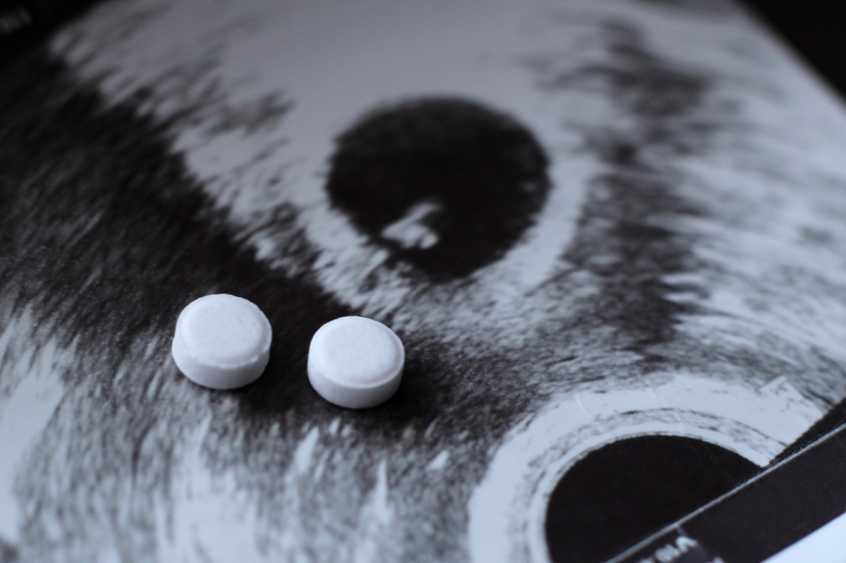
(CP) Years ago, two girls in their late teens became pregnant and sought help for their unplanned pregnancies. What they were told was that a chemical abortion was a fast, easy and effective way to end their pregnancies and carry on with their young lives. That lie and the scant information about what they were about to endure, they said, left them unprepared for the emotional and physical trauma that was to follow.
What Krissy Shivey wasn't warned about was that the amount of blood loss she was going to suffer would turn a bathroom stall into what she described as a "crime scene" after a murder. Soon after she swallowed the second of two abortion pills, also referred to as a "medical" or "medication abortion" she bled out.
Dora Esparza said she found herself blacking in and out of consciousness because the pain from the induced contractions after taking the second pill brought about painful contractions.
In a chemical abortion, women are given two drugs: mifepristone or RU-486, and misoprostol. Mifepristone works by blocking the effects of the natural pregnancy hormone progesterone. Misoprostol induces contractions and a miscarriage.
Both women, Shively from Louisiana and Esparza from Texas, eventually sought healing after their abortions, finding forgiveness through different post-abortive ministries that inspired them to share their testimonies with others who've had an abortion or are contemplating one.
The nation's largest abortion provider, Planned Parenthood, promotes chemical abortions as a "safe and effective" way to end a first-trimester pregnancy. Initially, the Food and Drug Administration only approved the use of these drugs to induce an abortion up to seven weeks into a pregnancy, or 49 days after conception. During the Obama administration, however, the FDA changed its protocol for use up to 60 days.
Sue Turner, director of Physicians for Life, previously told The Christian Post that under pressure, the FDA made this change because abortion providers were already dispensing the drugs up to 60 days, ignoring state law mandating that abortionists follow the FDA's original protocol.
After the U.S. Supreme Court overturned Roe v. Wade, concluding there is no constitutional right to abortion some groups, like Aid Access in Austria, have been sending abortion pills by mail to Americans across the country. These abortion pills are being mailed without women first consulting with a doctor to discuss health risks and the possible need for a surgical abortion afterward. The longer into a pregnancy a woman is when she takes the abortion pills the less likely they are to be effective at expelling the pregnancy, and the potential need for a surgical abortion increases. Thus, some women are then charged for both a chemical and surgical abortion.
Michael J. New, a researcher and associate scholar at the pro-life Charlotte Lozier Institute, spoke with The Christian Post about the health risks posed to women who have a chemical abortion.
New said as of 2018, the FDA has attributed 24 deaths and over 4,000 adverse events to abortion pills. Due to poor reporting of abortion data in the U.S., however, the pro-life researcher believes the actual numbers are likely higher.
He also noted that a 2015 study that analyzed 50,000 California women whose abortions were covered by Medicaid found the complication rate for chemical abortions was four times higher than for surgical abortions.
A separate study commissioned by the nonprofit group Support After Abortion and Shapard Research released in August surveyed 14,000 women, 114 of whom had a chemical abortion. Of the women who underwent a chemical abortion, 34% said their perception of themselves or their decision was negative following their abortion. Twenty-four percent sought help after their abortion, and an additional 39% didn't seek help but believed they could benefit from talking with someone.
The two women interviewed by CP who had chemical abortions and later sought healing highlighted the emotional trauma that can result from terminating a pregnancy.
"There is nothing natural or safe about it," Shivey told CP. "Essentially, you become your own abortionist, and nothing can prepare you for how traumatizing that is. Your safe place, whether it be your home or your workplace, becomes a graveyard. The emotional toll that it takes, the trauma that happens in those places that are supposed to feel safe ... You're robbed of so much more than the life of your child. You're robbed of your safe place."
Esparza shared similar sentiments, explaining that an abortion "stays with you forever, regardless of whether it's chemical or surgical."
"It's a permanent decision that you can never quite clean; you can never change it," she said. "The emotional side of it is life-changing."
Read the full report at The Christian Post
© The Christian Post













